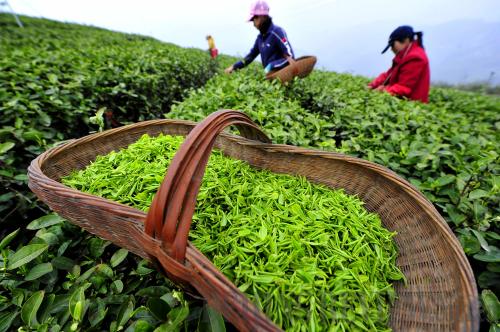|
 |
|
FRESH GREENS: Farmers harvest spring tea from a hill in Hubei Province on March 24 (YANG TAO) |
Though China has long been home to a tea culture, this intangible cultural heritage underwent a serious decline due to war and political unrest in the first half of the 20th century. Most classic books about tea culture were lost during this time.
However, some of the traditions of tea culture were preserved and passed down. Kungfu cha (cha means tea in Chinese) is a popular tea-drinking etiquette from Guangdong and Fujian provinces. The tea name kungfu in this sense relates to the time and work that go into brewing, serving and drinking and not the martial art kung fu.
Kungfu tea serves as an important tradition uniting families. In the past, a great number of people in Chaozhou, a coastal city in Guangdong Province, went abroad to make a living. In doing so they made kungfu tea wherever they resettled. Though these overseas Chinese have lived abroad for an extended period of time, drinking kungfu tea was a reminder of home.
"The survival of kungfu tea relies on unity of the family," said Chen Xiangbai, an inheritor of kungfu tea tradition and researcher at the China International Tea Culture Institute. "As long as families exist, kungfu tea will not disappear," he added.
Email us at: baishi@bjreview.com
History of Tea
The earliest record of tea is found in the ancient medicine book Shen Nong's Herbal Classic, compiled by various practitioners during the Warring States period (475-221 B.C.) to the Eastern Han Dynasty (25-220). According to the text, tea leaves were first discovered and tested to be healthy for human consumption by Shen Nong (also called Yan Emperor), a great ancestor of the Chinese nation who lived around 5,000 years ago. Until the Western Han Dynasty (202B.C.-A.D.9), tea was mainly used as herbal medicine before it gradually became a daily drink.
Tea drinking has been popular in south China over a long period. Not until the Tang Dynasty (618-907) did tea drinking spread across the entire country, in part helped by a poet Lu Yu's (733-804) The Book of Tea, the first and most comprehensive academic take on the origins, processing and drinking of tea in ancient China.
In the year 760, the poet secluded himself in a small village in the mountains of east China's Zhejiang Province to focus solely on the completion of his book on tea. Lu often explored the woods and mountains alone to look for sweet spring water and collect wild tea leaves as well as revel in the beautiful landscape. According to his book, natural spring water and wild tea are the best match for that perfect taste.
Advocated by Lu, tea culture should not only concentrate on the taste and color of the drink , but also emphasize the ware, environment and season for drinking it.
Thanks to his book, tea ascended to the level of art. During the Tang Dynasty, the culture of tea reached great heights and eventually spread to Southeast Asia and Japan. | 